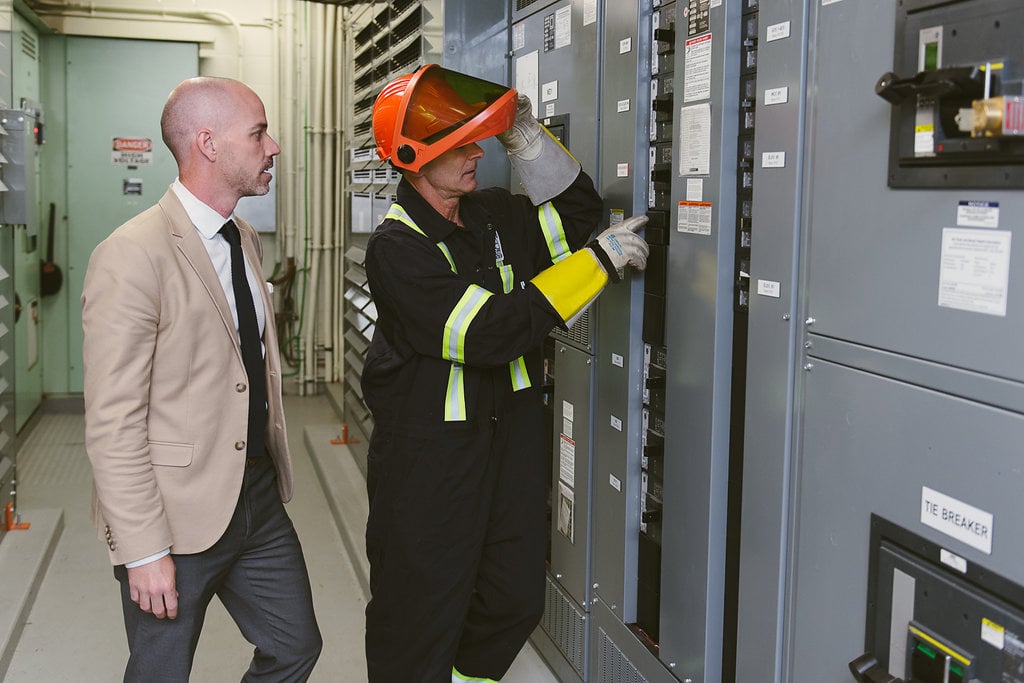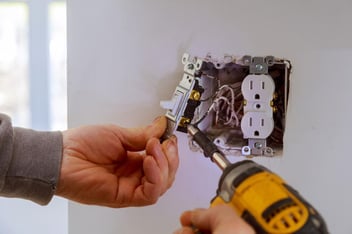An electrical operating permit makes sure that a qualified individual is responsible for your technical equipment on your premises. This includes the safe operation, maintenance and inspection of equipment.
We often get questions about these permits and why they're needed. Our electrical safety officers have compiled the most common questions and provided answers to help building owners and managers understand these permits better.
Q: What is an electrical operating permit?
Electrical operating permits are needed to operate and maintain electrical equipment in accordance with safety regulations. This permit ensures that a qualified individual is responsible for your technical equipment and its safe operation, maintenance, and inspection. They also maintain records of the equipment and make them available to safety officers if requested.
If you have a Field Safety Representative (FSR) overseeing the work, you can conduct regular maintenance without needing to get multiple electrical installation permits.
Q: Why is there a renewed focus on operating permits now?
The renewed focus on operating permits comes from several factors. Regulatory scrutiny and enforcement have increased in recent years due to incidents and the need to align with updated building codes and regulations. These updates account for technological advancements, changes in safety and environmental standards, and other considerations. Compliance with these requirements and obtaining operating permits is important to ensure public safety and mitigate risks.
Furthermore, the complexity of building systems and infrastructure has increased the importance of operating permits. They play a vital role in ensuring safety, equipment longevity, and cost savings by facilitating effective and efficient operation. Emerging technologies like energy management systems and EV charging stations bring additional safety hazards if not properly installed and maintained.
Q: Who is responsible for obtaining operating permits?
Generally, the building owner or operator is responsible for obtaining operating permits. They need to get the necessary permits before installing and maintaining electrical equipment or regulated products. It's their job to make sure the equipment is well-maintained and inspected as required.
In some cases, the tenant or lessee may be responsible for obtaining the operating permit if they have control over their own space within the building. This happens when the owner is not responsible for that particular space, but the electrical equipment in it still requires an operating permit and must follow the rules. In those situations, the tenant or lessee must get the permit and follow the regulations.
It's important for building owners and operators to check with the appropriate authorities and seek advice from professionals, like an FSR, to make sure they meet all the legal requirements for operating permits.
Q: What happens if a building or facility operates without an operating permit?
Operating without an operating permit is illegal and can lead to penalties, enforcement actions, and increased liability. It may also result in higher insurance costs. Additionally, it poses a risk to the safety of building occupants since the building hasn't undergone proper inspections and approval for compliance with codes and regulations. This can create hazardous conditions. Building owners and facility managers must ensure they have obtained all necessary permits and comply with applicable laws. Operating without a permit can have serious consequences, including investigations and fines from authorities like WorkSafeBC, attention from law enforcement agencies, violations of federal laws like Bill C-45, insurance issues, and civil liabilities for property damage or personal injury.
Q: What is the difference between an elevator operating permit and an electrical operating permit?
An elevator operating permit is specific to the elevator and its associated equipment installed after the elevator disconnect. It is obtained by the building owner or operator and ensures compliance with codes and standards. The elevator technician oversees compliance during installation, operation, maintenance, alterations, and repairs. On the other hand, an electrical operating permit covers the entire electrical system within the building or premises, from the main supply to all electrical distribution and equipment, including the elevator disconnect. The responsibility for obtaining an electrical operating permit lies with the building owner or operator and encompasses all electrical equipment and systems.
Q: Do all EV charging stations require an operating permit?
No, not all EV charging stations require an electrical operating permit, but an electrical installation permit is always needed for any regulated work related to the initial installation, repair, maintenance, or alteration of an EV charging station and its electrical equipment. The requirement for an electrical operating permit depends on local regulations. Some EV charging stations may require an operating permit if they meet specific criteria outlined in our information bulletin. It's recommended to check with the relevant regulatory body or local authorities for the specific requirements in your area.
Q: What is a field safety representative and how do I find one?
A Field Safety Representative (FSR) is a qualified and certified master electrician who must be named on every electrical operating permit. They have expertise in code standards, the Safety Standard Act, and regulations. The FSR represents the permit holder in code-related matters and ensures compliance with the regulations. They also ensure that workers performing regulated work have the appropriate qualifications and report any risks to a safety officer. The operating permit holder relies on the FSR's guidance to determine worker qualifications. To find a qualified FSR, building owners can use our Find a licensed contractor tool, which helps verify the licence number of a contractor, ensure compliance and avoid liability issues. Remember, an appropriate permit or written permission is required before performing regulated work on premises.
Are you ready to apply for an electrical operating permit? Find more information or apply online now.




